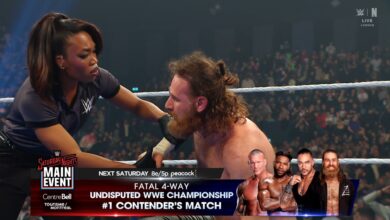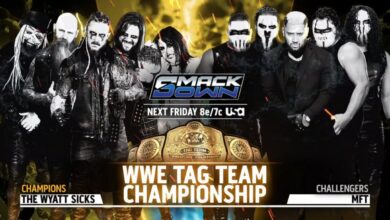Maria Kanellis Bennett Comments On WWE’s Human Resources Department And Changes They Could Make
Maria Kanellis Bennett has some ideas on how WWE can update their HR practices.
On April 15, 2021, ten superstars were released from the promotion, exactly one year after their previous round of “budget cuts” brought upon by the COVID-19 pandemic. Among those released was Mickie James. One week later, she posted a photo of her belongings being sent back to her in a trash bag with her name on it. The company responded by releasing the person responsible, but other former talents such as Gail Kim have said that this is nothing new.
Even Maria, who was released in 2010 and 2020, said that it has happened to her “twice.”
Whether WWE knows this is something that is happening or whether they’re oblivious, Maria sees it as a problem.
“I’m going to be very careful about how I word this,” Maria began. “Because I think that it’s important for people to understand the facts of the matter and not just make assumptions. I’ve received two boxes with trash bags in them of my stuff. The stuff is the gear that I leave at the show in a drawer because I don’t want to travel with it, ‘cause it’s too expensive and it weighs too much to be flying back and forth. Gear is very expensive. The people that make it, they spend a lot of time making it. So, that’s why we leave it there. So, I’ve received two boxes with my gear in a trash bag.”
“So, I think the bigger issue is that if they didn’t know that this was the practice, that’s a problem. If they knew it was a practice, that’s a problem,” she continued. “You should know what is happening with your former employees. Whether it be how they’re getting their stuff or whether there’s an exit interview, which I have had at any other job that I have left to find out—were you treated well? Anything you would like to discuss? Would you like to talk about how your interactions were with management? Management should know what is going on with their employees and with their former employees. The trash bag is symbolic of how WWE feels when you’re out the door. I feel like that’s the biggest issue.”
One way to remedy some of these issues would be to implement common workplace procedures, such as exit interviews.
“Mickie said the exact same thing in the sense that she thought it was symbolic of how she was treated for the last three years of her career. I think it was the last run of her career in WWE. So, I think that’s the biggest issue. That, to me, is the thing that they really need to look into,” Maria explained. “Why aren’t they doing exit interviews like at every other job? Why aren’t they making sure that when people receive their stuff, either those individuals should be able to go and pick their stuff up — like most jobs, you go and you take your box and fill your stuff up out of your office and then you take it with you or why isn’t it sent nicely wrapped like I received boxes from clothing companies? That’s the bigger issue. Why don’t they know if they don’t know?”
Keeping employee files for current and former employees will help management manage their staff more effectively and potentially curb frustrations or find solutions to remedy them in the future.
“They should do it,” Maria believes. “They should also have record of it. They should have records of how their employees feel. Not only for former employees, but they should also have records of how their employees feel that work for the company. My sister is in a corporate job. I know that they definitely do progress reports. They do interviews on how things are doing.”
Maria isn’t sure why they don’t do it but believes that perhaps they get away with it because the wrestlers are considered independent contractors.
“That is important,” she said. “I guess they get away with it because we’re independent contractors, but that’s not necessarily good.”
If talent is afraid to talk to HR because they’re worried about how it could affect their standing in the company, Maria asks, “You think that that’s systemic though?”
Many corporations will use outside firms to conduct these types of internal audits, and although it’s something she believes WWE should do, she’s not confident it’s something they will do. She added the following:
“That’s the issue at the end of the day. People have outside HR all the time. Especially billion-dollar companies. They don’t want to touch that. Part of my degree was HR. You have an outside company. If you’re fearful of that, you have an outside company that comes in and does these audits. I think it’s something they need to look into and it’s something they’ll probably never do. But, for me, being in the role that I have now, I take it very seriously how everyone feels as a person and wants to be heard. I take it very seriously a person’s health in the ring, their mental health, how they want to be seen creatively. This is important. This is a person’s life.”
“We all like to pretend like wrestlers are fake characters on TV that aren’t real human beings, but we’re still human beings at the end of the day,” Maria explained. “To not be treated like trash should be the number one thing any company is trying to do is not treat anybody like trash. Number one thing that companies should be trying to do is take care of their employees because the happier your employees are the better they perform. It doesn’t matter what company you work for—if you work at a restaurant, if you work at a college, you work wherever—the number one thing is the happier your employees are, the better they perform.”
While some will try to point the finger at Vince McMahon, Maria cautions that we should be careful to carefully examine the situation and see who was in charge, who is in charge and what the correlation may be.
“It should be. Especially nowadays with social media and with how easy it is to just get on a Zoom call with somebody and be like, ‘Hey, just doing a follow-up.’ But, I also think you gotta be careful to pinpoint it on one guy,” Maria notes. “Because he’s been in the role for how many years? I received my first trash back in 2010. Who was the head guy back then? I’m sure you can do the math on that. So, we should probably be careful not to pinpoint it on just one person. Because this has been a practice for, I think Gail said, fifteen years. So, this has been in place for a long time. I’ve never received a phone call follow-up that was from an HR person. I’ve never received a phone call to check in on me to see when I was ready to come back after my maternity leave. I’ve never received any of that. This is a bigger problem than one person.”
Maria Kanellis Bennett returned to ROH in 2020 after a five-year absence. She heads up their ROH The Experience and is also spearheading the rejuvenation of their Women’s Division.




